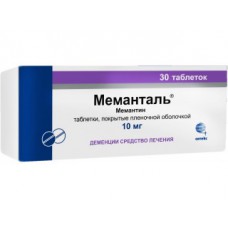Expiration date: 02/2026
Composition
Tablets, film-coated. 1 tablet contains active substance: memantine hydrochloride 10 mg. excipients core: lactose monohydrate - 149,75 mg - MKC - 27,1 mg - talc - 11,15 mg - silica colloidal anhydrous - 1.25 mg - magnesium stearate - 0.75 mg shell film: Opadry® white (lactose monohydrate - 2,16 mg, hypromellose - 1.68 mg, titanium dioxide - 1,56 mg, macrogol 4000 - 0.6 mg) 6 mg
Description pharmaceutical form
Tablets: round, biconvex, film-coated white color, with a broad line on one side and marked "M9MN" and "10" on the other.
Pharmacological action
Pharmacological action - cerebrovasculature, stimulating, antihypoxic, nootropic.
Pharmacodynamics
Possesses nootropic, cerebrovasculature, antihypoxic and psychoactive effect. Blocking glutamate N-methyl-D-aspartate receptors (NMDA receptors), including the substantia nigra, thus reducing the excessive stimulatory effect of cortical glutamate neurons in neostriatum developing on the background of inadequate allocation of dopamine. Reducing the flow of ionized calcium in neurons, reduces the possibility of their destruction. A greater impact on stiffness (rigidity and bradykinesia). Improves weakened memory, concentration, reduces fatigue and symptoms of depression, spasticity caused by diseases and injuries of the brain.
Pharmacokinetics
After intake of memantine is rapidly and completely absorbed from the gastrointestinal tract. Tmax in plasma is 2-6 h With normal renal function accumulation of memantine is not observed. The elimination of two-phase flows. T1/2 is the average in the 1st phase, 4 to 9 h in 2-second phase - 40-65 hours About 80% of memantine is excreted unchanged. Metabolites have no pharmacological activity. Excreted in the urine. In alkaline urine excretion slows down.
The testimony of the drug, Memantal®
Dementia moderate and severe degrees of severity in Alzheimer's disease.
Contraindications
- hypersensitivity to the drug
- severe violations of kidney function (Cl creatinine <,5-29 ml/min)-
- severe liver failure-
- lactose intolerance, the Lapp lactase deficiency or glucose-galactose malabsorption (the drug contains lactose monohydrate)-
- pregnancy
- breastfeeding
- children up to age 18 years (effectiveness and safety have not been established).
With caution: hyperthyroidism - epilepsy - convulsions (including history)- simultaneous use of other antagonists of NMDA receptors (amantadine, ketamine, dextromethorphan)- the presence of factors that increase the pH of urine (sudden change of diet, taking large amounts of alkaline gastric buffers)- a severe urinary tract infection myocardial infarction history of heart failure III-IV functional class (NYHA classification)- uncontrolled hypertension - renal and liver failure.
Application of pregnancy and breastfeeding
No data on the use of memantine in pregnant women. Memantine should be used only in the case when expected benefit for mother exceeds the potential risk to the fetus.
No data on the penetration of memantine in breast milk. Taking into account the structure of the lipophilic active substance of the drug, it can be assumed that memantine may penetrate into breast milk, therefore it is recommended to stop breastfeeding while taking the drug.
Side effects
The incidence of adverse reactions was classified as follows: very often - %26ge-1/10 - often - %26ge-1/100, <,1/10 - rare - %26ge-1/1000, <,1/100 - rare - %26ge-1/10000, <,1/1000 very rare <,1/10000 - frequency unknown (at present data on the prevalence of adverse reactions do not exist).
CNS: frequently - headache, drowsiness, dizziness - rarely - confusion, hallucinations (mainly in patients with Alzheimer's disease at the stage of severe dementia), gait disturbance, very rarely - seizures - the frequency found in psychotic reactions.
From the digestive system: often - constipation - rarely - nausea, vomiting frequency not set - pancreatitis.
From the CCC: rarely - arterial hypertension, venous thrombosis/thromboembolism.
Other: rare - fatigue, fungal infection.
There were sporadic reports of the occurrence of these adverse reactions with the use of memantine in clinical practice: dizziness, drowsiness, irritability, fatigue, anxiety, increased intracranial pressure, nausea, hallucinations, headache, impaired consciousness, hypertonia, gait disturbance, depression, convulsions, psychotic reactions, suicidal thoughts, constipation, nausea, pancreatitis, candidiasis, increased blood pressure, vomiting, cystitis, increased libido, venous thrombosis, thromboembolism, allergic reactions.
Interaction
Enhances the effect of levodopa, dopamine receptor antagonists, m-holinoblokatorov.
Reduces the effects of barbiturates and neuroleptics.
Changes (increases or decreases) the effect dantrolene or baclofen, so doses should be selected individually.
Avoid concomitant use with amantadine, ketamine, phenytoin and dextromethorphan due to the increase risk of psychosis.
Possible increase in plasma concentrations of cimetidine, ranitidine, procainamide, quinidine, quinine and nicotine.
It is possible to reduce the level of hydrochlorothiazide. Memantine is able to increase the excretion of hydrochlorothiazide.
MHO may increase in patients taking oral anticoagulants (warfarin).
Concurrent use with antidepressants, SSRIs and MAO inhibitors requires careful monitoring of the patients.
Method of application and doses
Inside, 1 time a day, at the same time, regardless of the meal.
The mode set individually. To start treatment with the appointment of the minimum effective dose. Prescribe the drug for the 1st week of treatment (days 1-7) in a dose of 5 mg/day, for 2 weeks (days 8-14), in the dose of 10 mg/day during the 3rd week (days 15-21) - at a dose of 15 mg/day, for 4 weeks (days 22 to 28) in the dose of 20 mg/day. The maximum daily dose of 20 mg.
Special groups of patients
Patients older than 65 years and patients with Cl creatinine 50-80 ml/min dose adjustment is not required. In patients with moderate renal insufficiency (Cl creatinine 30-49 ml/min) the daily dose is 10 mg. In the future, with good tolerability for 7 months, the dose can be increased to 20 mg according to the standard scheme.
Instructions for dividing the tablet
Place rounded side of tablet on a hard surface, line up. Push the index finger and thumb of one hand on the opposite side of the tablet, keep pressure with your fingers as long as the pill doesn't break up into 2 parts (see picture).
Overdose
Symptoms: dizziness, tremor, agitation, drowsiness, confusion, agitation, stupor, convulsions, psychosis, aggressiveness, hallucinations, vomiting, unsteadiness of gait, diarrhea.
Treatment: gastric lavage, the appointment activated carbon, symptomatic therapy. The specific antidote of the drug does not exist.
Special instructions
Effects on ability to drive vehicles and operate machinery. In patients with Alzheimer's disease at the stage of moderate or severe dementia usually impaired ability to drive vehicles and management of complex mechanisms. In addition, memantine can cause a change reaction rate, therefore, patients should refrain from driving or operating complex mechanisms.
Release form
Tablets, film-coated, 10 mg aluminium/PVC blisters of 10 or 14 pieces of 3, 6, 9 and 10 blisters on 10 table. or 2 and 8 blister of 14 pills. in a cardboard box.
Storage conditions of the drug, Memantal®
At a temperature not exceeding 25 °C.
Keep out of reach of children.
The shelf life of the drug, Memantal®
3 years.




